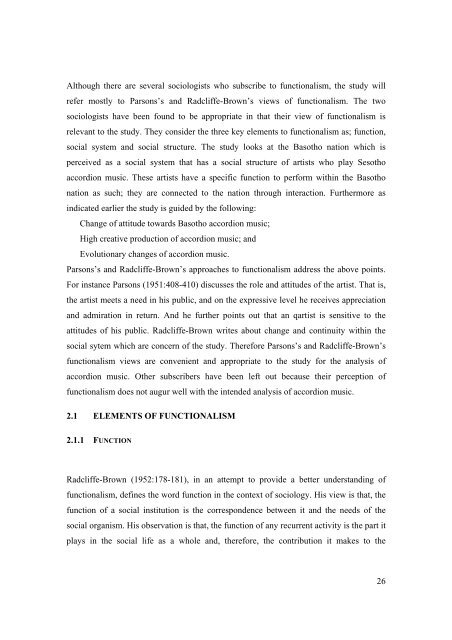Analysis of the language techniques and thematic - University of the ...
Analysis of the language techniques and thematic - University of the ...
Analysis of the language techniques and thematic - University of the ...
Create successful ePaper yourself
Turn your PDF publications into a flip-book with our unique Google optimized e-Paper software.
Although <strong>the</strong>re are several sociologists who subscribe to functionalism, <strong>the</strong> study will<br />
refer mostly to Parsons’s <strong>and</strong> Radcliffe-Brown’s views <strong>of</strong> functionalism. The two<br />
sociologists have been found to be appropriate in that <strong>the</strong>ir view <strong>of</strong> functionalism is<br />
relevant to <strong>the</strong> study. They consider <strong>the</strong> three key elements to functionalism as; function,<br />
social system <strong>and</strong> social structure. The study looks at <strong>the</strong> Basotho nation which is<br />
perceived as a social system that has a social structure <strong>of</strong> artists who play Sesotho<br />
accordion music. These artists have a specific function to perform within <strong>the</strong> Basotho<br />
nation as such; <strong>the</strong>y are connected to <strong>the</strong> nation through interaction. Fur<strong>the</strong>rmore as<br />
indicated earlier <strong>the</strong> study is guided by <strong>the</strong> following:<br />
Change <strong>of</strong> attitude towards Basotho accordion music;<br />
High creative production <strong>of</strong> accordion music; <strong>and</strong><br />
Evolutionary changes <strong>of</strong> accordion music.<br />
Parsons’s <strong>and</strong> Radcliffe-Brown’s approaches to functionalism address <strong>the</strong> above points.<br />
For instance Parsons (1951:408-410) discusses <strong>the</strong> role <strong>and</strong> attitudes <strong>of</strong> <strong>the</strong> artist. That is,<br />
<strong>the</strong> artist meets a need in his public, <strong>and</strong> on <strong>the</strong> expressive level he receives appreciation<br />
<strong>and</strong> admiration in return. And he fur<strong>the</strong>r points out that an qartist is sensitive to <strong>the</strong><br />
attitudes <strong>of</strong> his public. Radcliffe-Brown writes about change <strong>and</strong> continuity within <strong>the</strong><br />
social sytem which are concern <strong>of</strong> <strong>the</strong> study. Therefore Parsons’s <strong>and</strong> Radcliffe-Brown’s<br />
functionalism views are convenient <strong>and</strong> appropriate to <strong>the</strong> study for <strong>the</strong> analysis <strong>of</strong><br />
accordion music. O<strong>the</strong>r subscribers have been left out because <strong>the</strong>ir perception <strong>of</strong><br />
functionalism does not augur well with <strong>the</strong> intended analysis <strong>of</strong> accordion music.<br />
2.1 ELEMENTS OF FUNCTIONALISM<br />
2.1.1 FUNCTION<br />
Radcliffe-Brown (1952:178-181), in an attempt to provide a better underst<strong>and</strong>ing <strong>of</strong><br />
functionalism, defines <strong>the</strong> word function in <strong>the</strong> context <strong>of</strong> sociology. His view is that, <strong>the</strong><br />
function <strong>of</strong> a social institution is <strong>the</strong> correspondence between it <strong>and</strong> <strong>the</strong> needs <strong>of</strong> <strong>the</strong><br />
social organism. His observation is that, <strong>the</strong> function <strong>of</strong> any recurrent activity is <strong>the</strong> part it<br />
plays in <strong>the</strong> social life as a whole <strong>and</strong>, <strong>the</strong>refore, <strong>the</strong> contribution it makes to <strong>the</strong><br />
26

















